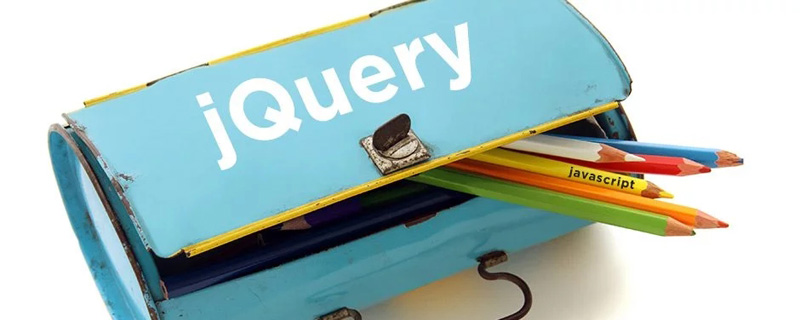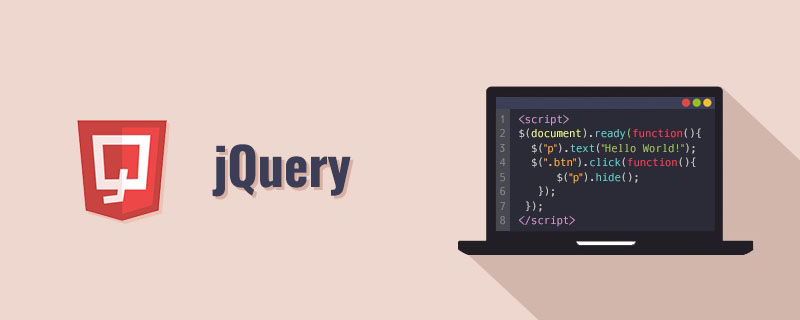 Web Front-end
Web Front-end JS Tutorial
JS Tutorial Detailed explanation of jQuery queue control methods queue()/dequeue()/clearQueue()
Detailed explanation of jQuery queue control methods queue()/dequeue()/clearQueue()jQueryIn the core, there is a set of queue control methods. This set of methods consists of three methods: queue()/dequeue()/clearQueue(). The control of functions executed sequentially can be said to be concise and easy. It is mainly used in the animate () method, ajax and other events that need to be executed in chronological order.
Let’s first explain this set of methods Their respective meanings.
queue(name,[callback]): When only one parameter is passed in, it returns and points to the queue of the first matching element (will be an array of functions, queue name The default is fx); when two parameters are passed in, the first parameter still defaults to the queue name of fx, and the second parameter is divided into two situations. When the second parameter is a function, it will be in A function is finally added to the queue of matching elements. When the second parameter is a function array, it will replace the queue of matching elements with a new queue (function array). Maybe, this is a bit confusing to understand. Later, You will see the DEMO later.
dequeue(name): This is easy to understand, it is to remove a queue function from the front of the queue and execute it.
clearQueue ([queueName]):This is a new method added in 1.4. Clear all queues that have not yet been executed on the object. The parameter is optional and the default is fx. However, I personally feel that this method is not very useful, so use The queue() method can implement the clearQueue method by passing in the second parameter of the two parameters.
Now, we want to achieve such an effect. There are numbered squares marked from 1 to 7, and these seven squares are required from left to Click here to view the DEMO

$('.one').delay(500).animate({top:'+=270px'},500,function(){
$('.two').delay(500).animate({top:'+=270px'},500,function(){
$('.three').delay(500).animate({top:'+=270px'},500,function(){
$('.four').delay(500).animate({top:'+=270px'},500,function(){
$('.five').delay(500).animate({top:'+=270px'},500,function(){
$('.six').delay(500).animate({top:'+=270px'},500,function(){
$('.seven').animate({top:'+=270px'},500,function(){
alert('按序落体运动结束! Yeah!')
});
});
});
});
});
});
});Well, yes, the effect is perfectly presented, but this kind of dizzy code, Can you bear it? Even if you can bear it, what if you want to change a certain execution order at this time, for example, you want 5 to fall before starting to fall 3, or add eight new blocks from 8 to 15, what should you do? Re- Do you want to write it? Are you careful about the changes in it? Obviously, we need another concise and convenient method to achieve this effect, that is, the jQuery queue control method. Please see the following code:
var _slideFun=[
function(){$('.one').delay(500).animate({top:'+=270px'},500,_takeOne);},
function(){$('.two').delay(300).animate({top:'+=270px'},500,_takeOne);},
function(){$('.three').delay(300).animate({top:'+=270px'},500,_takeOne);},
function(){$('.four').delay(300).animate({top:'+=270px'},500,_takeOne);},
function(){$('.five').delay(300).animate({top:'+=270px'},500,_takeOne);},
function(){$('.six').delay(300).animate({top:'+=270px'},500,_takeOne);},
function(){$('.seven').delay(300).animate({top:'+=270px'},500,function(){
alert('按序落体运动结束! Yeah!');
});}
];
$('#demo').queue('slideList',_slideFun);
var _takeOne=function(){
$('#demo').dequeue('slideList');
};
_takeOne();In this way, does it seem much simpler? How to implement it? 1. Create a new array and put the
animation functions into it in sequence (change the order in this way and add a new Is animation much more convenient?); 2. Use queue to add this set of animation function arrays to the slideList queue;
3. Use dequeue to take out the first function in the slideList queue and execute it;
4. Initial execution of the first function.
There are also detailed explanations in the DEMO demonstration
Comments. If you still don’t understand the above explanation, please look at the source code. As for the clearQueue() method, just Not much to say, the stop button in the demonstration calls the clearQueue() method. Of course, you can also use the queue() method to directly replace the current function queue with an [] empty array implementation (I personally recommend empty array replacement., which is more intuitive) ).
The above is the detailed content of Detailed explanation of jQuery queue control methods queue()/dequeue()/clearQueue(). For more information, please follow other related articles on the PHP Chinese website!
 jquery实现多少秒后隐藏图片Apr 20, 2022 pm 05:33 PM
jquery实现多少秒后隐藏图片Apr 20, 2022 pm 05:33 PM实现方法:1、用“$("img").delay(毫秒数).fadeOut()”语句,delay()设置延迟秒数;2、用“setTimeout(function(){ $("img").hide(); },毫秒值);”语句,通过定时器来延迟。
 jquery怎么修改min-height样式Apr 20, 2022 pm 12:19 PM
jquery怎么修改min-height样式Apr 20, 2022 pm 12:19 PM修改方法:1、用css()设置新样式,语法“$(元素).css("min-height","新值")”;2、用attr(),通过设置style属性来添加新样式,语法“$(元素).attr("style","min-height:新值")”。
 axios与jquery的区别是什么Apr 20, 2022 pm 06:18 PM
axios与jquery的区别是什么Apr 20, 2022 pm 06:18 PM区别:1、axios是一个异步请求框架,用于封装底层的XMLHttpRequest,而jquery是一个JavaScript库,只是顺便封装了dom操作;2、axios是基于承诺对象的,可以用承诺对象中的方法,而jquery不基于承诺对象。
 jquery怎么在body中增加元素Apr 22, 2022 am 11:13 AM
jquery怎么在body中增加元素Apr 22, 2022 am 11:13 AM增加元素的方法:1、用append(),语法“$("body").append(新元素)”,可向body内部的末尾处增加元素;2、用prepend(),语法“$("body").prepend(新元素)”,可向body内部的开始处增加元素。
 jquery中apply()方法怎么用Apr 24, 2022 pm 05:35 PM
jquery中apply()方法怎么用Apr 24, 2022 pm 05:35 PM在jquery中,apply()方法用于改变this指向,使用另一个对象替换当前对象,是应用某一对象的一个方法,语法为“apply(thisobj,[argarray])”;参数argarray表示的是以数组的形式进行传递。
 jquery怎么删除div内所有子元素Apr 21, 2022 pm 07:08 PM
jquery怎么删除div内所有子元素Apr 21, 2022 pm 07:08 PM删除方法:1、用empty(),语法“$("div").empty();”,可删除所有子节点和内容;2、用children()和remove(),语法“$("div").children().remove();”,只删除子元素,不删除内容。
 jquery怎么去掉只读属性Apr 20, 2022 pm 07:55 PM
jquery怎么去掉只读属性Apr 20, 2022 pm 07:55 PM去掉方法:1、用“$(selector).removeAttr("readonly")”语句删除readonly属性;2、用“$(selector).attr("readonly",false)”将readonly属性的值设置为false。
 jquery on()有几个参数Apr 21, 2022 am 11:29 AM
jquery on()有几个参数Apr 21, 2022 am 11:29 AMon()方法有4个参数:1、第一个参数不可省略,规定要从被选元素添加的一个或多个事件或命名空间;2、第二个参数可省略,规定元素的事件处理程序;3、第三个参数可省略,规定传递到函数的额外数据;4、第四个参数可省略,规定当事件发生时运行的函数。


Hot AI Tools

Undresser.AI Undress
AI-powered app for creating realistic nude photos

AI Clothes Remover
Online AI tool for removing clothes from photos.

Undress AI Tool
Undress images for free

Clothoff.io
AI clothes remover

AI Hentai Generator
Generate AI Hentai for free.

Hot Article

Hot Tools

SublimeText3 Mac version
God-level code editing software (SublimeText3)

SAP NetWeaver Server Adapter for Eclipse
Integrate Eclipse with SAP NetWeaver application server.

Atom editor mac version download
The most popular open source editor

mPDF
mPDF is a PHP library that can generate PDF files from UTF-8 encoded HTML. The original author, Ian Back, wrote mPDF to output PDF files "on the fly" from his website and handle different languages. It is slower than original scripts like HTML2FPDF and produces larger files when using Unicode fonts, but supports CSS styles etc. and has a lot of enhancements. Supports almost all languages, including RTL (Arabic and Hebrew) and CJK (Chinese, Japanese and Korean). Supports nested block-level elements (such as P, DIV),

SecLists
SecLists is the ultimate security tester's companion. It is a collection of various types of lists that are frequently used during security assessments, all in one place. SecLists helps make security testing more efficient and productive by conveniently providing all the lists a security tester might need. List types include usernames, passwords, URLs, fuzzing payloads, sensitive data patterns, web shells, and more. The tester can simply pull this repository onto a new test machine and he will have access to every type of list he needs.





